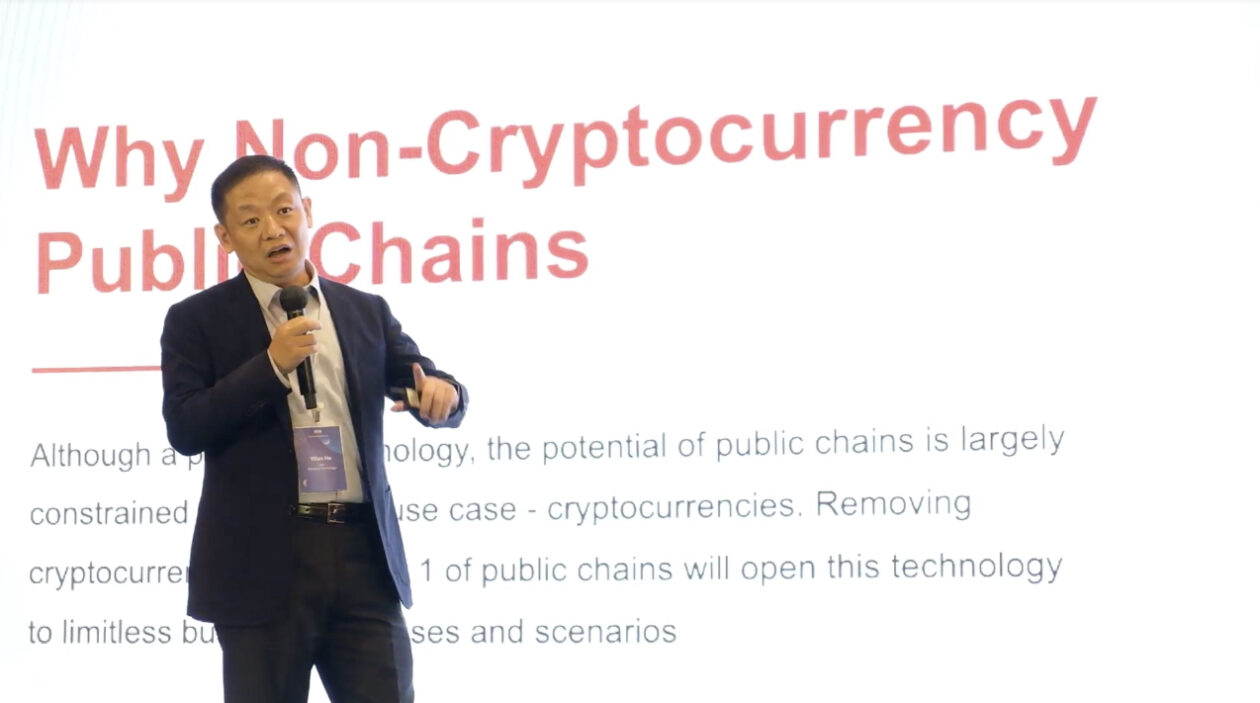China’s Blockchain-based Service Network (BSN), a major state-backed digital infrastructure company, on Tuesday launched BSN Spartan Network, which it said is a new international network for public blockchains with no cryptocurrency involved.
BSN, regarded by some as leading the digital equivalent of Beijing’s multibillion-dollar Belt and Road infrastructure plan, was founded in 2020 to help shape China’s Web 3.0 infrastructure. It has powerful backers, including the National Development and Reform Commission, which sets and executes national economic policy.
“Cryptocurrency — we consider it as a speculative asset,” Yifan He, an MIT graduate and the chief executive officer of BSN developer Red Date Technology, said at the launch of the Spartan Network on Tuesday in Hong Kong – reiterating the policy that cryptocurrencies are not welcome in China.
The BSN Spartan Network, only available outside mainland China, will support three public chains – Ethereum, Cosmos and PolygonEdge – in “non-crypto versions” that are hard forks of their original public chain frameworks, BSN said in its Spartan whitepaper released the same day.
The word “blockchain” appeared for the first time in China’s economic planning strategy in March 2021, specifically the five-year plan to set priorities through 2025.
It speaks to developing so-called consortium blockchains in finance, supply-chain management, governmental affairs and many other fields. Consortium blockchains are regarded as less transparent than public versions that allow open participation, but offer faster processing and efficiency.
Nixing crypto
While Beijing shows enthusiasm for blockchain technology, it banned use of cryptocurrencies in September 2021, a dictate that determines how BSN operates.
The company, which is split into BSN China and BSN International in Hong Kong, has said it aims to build a global network that will allow connectivity between different blockchains, improving efficiency and cutting costs for clients. Last year, it set up portals in Hong Kong, South Korea, Turkey and Uzbekistan.
The company, which raised US$30 million in a funding round in June 2021 led by Saudi Arabia’s Prosperity7 Ventures, sees the new Spartan Network as another bridge into overseas markets.
“Until today, 99.9% of all the IT systems in the world don’t use public chains. And 99% of the applications on public chains are about cryptocurrencies,” said CEO He.
The removal of cryptocurrencies is “the only way to enable traditional IT systems to begin using blockchain and public chain technologies as part of their overall IT architectures,” BSN said in the whitepaper.
Such a non-crypto feature has appealed to some businesses put off by crypto’s price volatility.
Multinational bank HSBC Holdings, whose CEO last year said crypto was not for them, plans to explore how BSN Spartan could help “streamline payment processes for its business partners,” Vincent Lau, the bank’s regional head of international payments for Asia Pacific, said on Tuesday in a statement.
Use cases
Most blockchain builders in China, including tech giants Alibaba and Tencent, are creating their own consortium blockchains with fiat currency as the only means of payment.
Ant Group, Aliabab’s fintech affiliate, has built AntChain, where its non-fungible tokens (NFTs) live as a form of “digital collectibles.”
Tencent also has its own blockchain service Zhixin Chain, which powers its NFT platform Huanhe. Tencent, however, halted NFT sales on Huanhe last month to “focus on the company’s core strategic considerations.”
China’s courtrooms have started to adopt blockchain technology in evidence filing and the Supreme People’s Court of China has called for blockchain-based systems to be built across the country by 2025 to connect local courts.
China’s National Energy Administration is considering use of blockchain platforms for electricity trading between power plants and state and national grids, according to an agency policy document.
Building new
Katherine Ng, managing director of Tezos APAC, the blockchain’s regional unit, told Forkast in a video interview that it works with BSN in the Chinese market.
“When it comes to the BSN network, it’s a way for us to participate and engage with developers in China in a compliant way,” Ng said.
“Private consortium blockchains in China don’t really interact with each other, even within China itself,” Ng said. “But I believe more aggregated networks, like BSN, can help actually move this interoperability standard forward.”
Shanghai authorities, struggling to revive the city after months of Covid 19 lockdowns, see economic opportunities in blockchain.
A city policy paper in July proposed support for NFTs and those companies researching and piloting asset digitization, the trading of digital intellectual property, and digital ownership.
The city said it will set up a US$1.4 billion fund to invest in metaverse-related projects and set a goal to build an industry worth 350 billion yuan (US$50.6 billion) by the end of 2025.
“Companies that build blockchain infrastructure are thriving and they could slowly become mainstream in the Web3 space in China,” said Dean Peng, vice president of Metalpha, a Singapore-based digital asset management platform backed by Antpool, a mining pool affiliated with Chinese mining rig giant Bitmain.
China’s digital infrastructure builders are trying to integrate blockchain with artificial intelligence technology, privacy computing and game engine development, said Peng. “These areas are strongly encouraged [by the government] and are fully compliant.”





